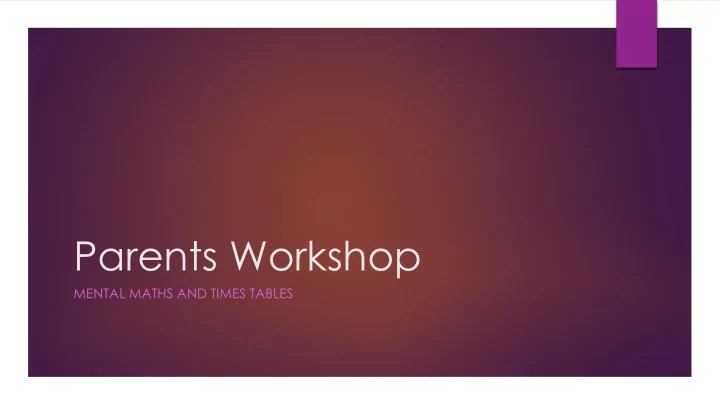

Parents Workshop MENTAL MATHS AND TIMES TABLES
Importance of Time Tables to all Maths “Pupils should be able to recite their times tables up to 12 x 12 by the age of nine.” – Ofsted It is essential that children understand the importance of learning multiplication facts and see how they are used and applied in everyday life. Area and perimeter Money Fractions Decimals Measure Time Multiplication and Factors and Percentages division multiples
Times Tables Expectations for each year group Year Group Expectations Year 3 Recall and use multiplication and division facts for 3, 4, 6, 8 Year 4 Recall multiplication and division facts for multiplication tables up to 12 x 12 Year 5 and 6 All multiplication facts and division facts up to 12 x 12 should be known and recalled quickly. They should be able to apply their knowledge to related problems including whole numbers and decimals. For example: 30 x 6 = How many 70s in 350? 3.5 ÷ 0.7 = Should also have knowledge to be able to square and cube numbers up to 12
Times Tables Testing in School All children are tested each week in a timed situation in order to show progress towards instant recall of all times tables up to 12x12 These range from the ‘Dinosaur C hallenge’ in year 3 - working on groups of times tables, up to year 5 and 6 where they are aiming to do 100 questions in under 5 minutes with a mixture of multiplication, division, squares and square roots etc. The children are tested at their ability and are challenged to beat their scores each week and then are able to progress to the next level
Further expectations for Year 5 and 6 6 x 7 = 42 7 x 6 = 42 4.2 ÷ 7 = 0.6 Square and cube numbers 42 ÷ 7 = 6 Prime numbers 4,200,000 ÷ 6 = 700,000 Adding and subtracting fractions Finding and using fraction, decimal and percentages equivalences Metric conversions Applying times tables facts to help solve multiplication and divisions of numbers up to 10,000,000 including decimals
How to help children remember their times tables? How do we get children to remember all of the facts? All children learn differently, but there may be a learning style that appeals to your child. Visual learners – seeing and reading – pictures, posters Auditory learners – listening and speaking – reciting by rote Kinaesthetic learners – touching and doing. This does not mean that we only focus on one type of activity but try a range of activities.
Games Pairs: Write answers to a times table on one set of cards. On another set, write the questions, turn them face down. Mix them and put them into a grid. Each person gets to turn over two cards, if they find a matching pair (the question and the answer) they get to keep the pair and have another turn, if not they must put them back into the grid in the same place and the next person gets a turn. This improves memory as well as recall. Bingo: Use a six square grid and write some answers to a given timetable in the grid. On cards write down the questions. Each person takes turns to draw a card and answer the question. If they have the answer in their grid, they can cross it out. First person to get a line wins. ‘Follow me’ loop cards – cards designed to create a chain of connected facts. On your tables are sets of loop cards. See how quick you can complete the loop. This is a race!!!
Mnemonics and Rhymes With your child you could design fun mnemonics to help learn their times tables. Use phrases which sound like numbers if it helps. Try writing a list of words that rhyme with your tables, five - hive, ten - hen, fifteen - seen! Write the list out and invent a story using the words.
Songs Extend further into songs and rhymes For example: 1 x 3 = 3 the little boy climbed up the tree, 2 x 3 = 6 the little boy snapped off some sticks, 3 x 3 = 9 he climbed down the washing line, … etc By adding actions to the songs will aid memory even further. You will also find times tables songs on line Examples of songs http://www.fastertimestables.com/cool-times-tables-songs/ On your tables please take 5 minutes to try and come up with a time tables song for one of the times tables. Read back and emphasise the rhyming words. Can anyone guess which times table it is?
Times Tables SATs Starting this year with a pilot group (80 schools/3000 children), Year 6 children will have a separate times tables test when they undertake their SATs From May 2017 all children in England will be administered the Times Tables test The test will be computerised and the results will go directly to the DfE We do not know yet if we have been chosen as part of the pilot group
Support for Parents at home On the website: Expectations of mental maths knowledge per year group Page with a large number of websites which will give the children interactive games they can play to support times tables and all skills A number of free resources to print out and use at home
Recommend
More recommend